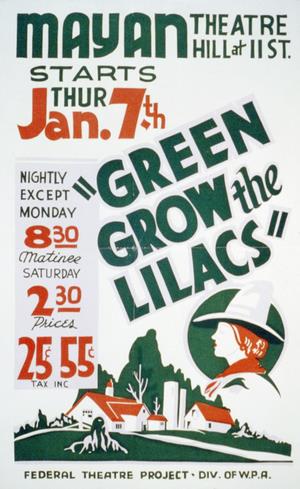Green Grow the Lilacs is a 1930 play by Lynn Riggs named for the popular folk song of the same name. It was performed 64 times on Broadway, opening on January 26, 1931 and closing March 21, 1931. It also played January 19, 1931 through January 24, 1931 at the National Theatre in Washington, D.C. It was produced by the Theatre Guild and directed by Herbert J. Biberman. Rather startlingly, the debonair, ultrasophisticated actor Franchot Tone portrayed cowboy Curly. June Walker was seen as his sweetheart Laurey. Tex Ritter sang four songs in the role of Cord Elam and was understudy for the lead part as Curly, though he never had occasion to perform in that role. Theatre Guild board member Helen Westley, who had appeared as Mrs. Muskat in the original Broadway production of Ferenc Molnár's Liliom, played Aunt Eller. Lee Strasberg, later to become a renowned teacher of method acting, played the part of the Syrian peddler.The play also toured the Midwest, and was nominated for a Pulitzer Prize. It appeared at the Dallas Little Theatre during the week of March 7, 1932, and again in Dallas at the Festival of Southwestern Plays, on May 10, 1935. Although the 1943 Rodgers and Hammerstein musical play Oklahoma!, which is based on the Riggs play, used a new score rather than the old folk songs in Riggs' work, the plot of Green Grow The Lilacs is almost identical, except for the ending, which unlike that of the musical, is left rather undecided as to Curly's trial for accidentally killing farmhand Jeeter (renamed Jud Fry in the musical). In addition, the cowboy Will Parker is only referred to in the original Riggs play; he does not actually appear in it. Therefore, the entire comic subplot involving the fifty dollars that Will must obtain in order to be able to marry Ado Annie is an invention of Hammerstein's.Green Grow the Lilacs is today largely forgotten in its original form, while Oklahoma! remains one of the most acclaimed and popular American musicals ever written.

Fecha del estreno
1930-12-08
Año del estreno
1930
Escenario
Indian Territory (Oklahoma), 1900
Tema de una obra
Love



Comentar
0